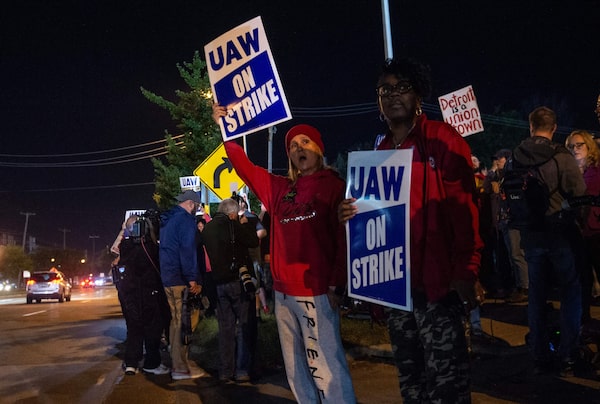
Members of the United Auto Workers picket and hold signs outside of the UAW Local 900 headquarters across the street from the Ford Assembly Plant in Wayne, Mich., on Sept. 15.MATTHEW HATCHER/AFP/Getty Images
As the United Auto Workers union launches strikes against the Detroit Three, experts say any work stoppage could have an impact in Canada, hobbling the tightly integrated auto sector as it tries to resume usual operations after the pandemic disruptions.
The U.S. union went on strike at three factories owned by Ford Motor Co. F-N, General Motors GM-N and Stellantis early on Friday morning, halting work at assembly plants in Wayne, Mich., Wentzville, Mo., and Toledo, Ohio. UAW president Shawn Fain said the targeted strikes could go companywide if no agreements are reached.
U.S. auto workers launch first simultaneous strike at Detroit Three
The action by some 12,700 U.S. autoworkers is taking place ahead of the Sept. 18 strike deadline for 5,680 unionized workers at Ford of Canada. The Unifor members, along with their counterparts at GM and Stellantis, gave their representatives an overwhelming strike mandate as the union targets Ford for intensive bargaining toward a contract that will set the pattern for negotiations with GM and Stellantis.
Lana Payne, Unifor’s national president, said negotiators have rejected two offers from Ford since Aug. 29 because they are “not close” to their expectations. “They are negotiating but we are not there yet,” Ms. Payne said on Thursday evening.
In a webcast statement on Thursday evening before the UAW strike, Unifor’s Ms. Payne called the auto talks historic, coming at a time working people are struggling with soaring inflation while the automakers make record profits. At the same time, the auto sector is pivoting to produce plug-in and hybrid electric vehicles, spending billions to retool factories and upending work forces.
“There is a lot at stake in these talks for everyone,” she said.
Speaking before the UAW strike, Flavio Volpe, head of the Automotive Parts Manufacturers’ Association, said a U.S. work stoppage would have an “immediate and direct” effect on the Canadian industry, causing plants to slow or halt production within a couple days.
“We are so integrated,” Mr. Volpe said by phone.
Mr. Volpe represents most parts makers in Canada that employ a total of about 100,000. These companies are suppliers to the Detroit Three as well as other automakers in Canada and the United States. Some Canadian manufacturers, including Linamar Corp. and Magna International, have large U.S.-based operations that supply assembly plants run by Ford, GM and Stellantis.
Almost half of the auto parts made in Ontario are shipped to assembly plants in the United States, Mr. Volpe said.
Manufacturers will be loath to lay off workers because of the tight labour market, he said.
Automakers rely on just-in-time delivery of parts, and do not have stockpiles to dip into. Additionally, some auto components cross U.S., Canadian and Mexican borders as many as eight times before final assembly, the industry says.
“There’s a number of U.S. plants that supply Canada and vice versa. There’s a number of criss-crossing lines,” said K. Venkatesh Prasad, senior vice-president of research at Ann Arbor-based Center for Automotive Research.
“The part with the shortest stock is the one that will cause the line to stop,” Mr. Prasad said.
The automotive manufacturing sector employs about 135,000 people in Canada, most of whom are in Ontario. Vehicles are Canada’s second-largest export by value, according to the Canadian Vehicle Manufacturers’ Association, which lobbies for the Detroit Three.
At the Detroit Three in Ontario, Unifor is bargaining on behalf of 18,000 workers at assembly plants, parts-distribution centres and other facilities.
The U.S. strike targeted factories that make Ford Bronco, Jeep Wrangler and Chevrolet Colorado pickup trucks, and other models.
Itay Michaeli, an analyst at Citigroup, noted that the UAW has focused on mid-sized trucks and SUVs, not the more profitable full-sized pickups. Still, the automakers have limited inventories of these models and will see their revenues fall every day the strike is on.
“The weekend is key,” he said in a research note on Friday. “If both sides can reach agreements by Sunday, then a one-day strike shouldn’t materially affect GM’s and Ford’s respective 2023 outlooks.
”If there’s no resolution by Tuesday or Wednesday, then we’d think the odds of a lengthier strike grow. We’ll have to monitor whether the UAW decides to expand strikes to other plants, and whether these strikes possibly lead to other production disruptions.”